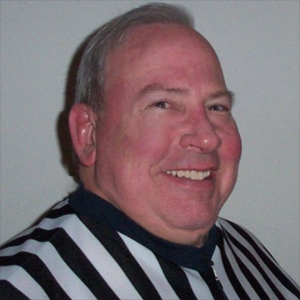
Rndballref
20 Years Experience
Chicago, IL
Male, 60
For twenty years I officiated high school, AAU and park district basketball games, retiring recently. For a few officiating is the focus of their occupation, while for most working as an umpire or basketball referee is an avocation. I started ref'ing to earn beer money during college, but it became a great way to stay connected to the best sports game in the universe. As a spinoff, I wrote a sports-thriller novel loosely based on my referee experiences titled, Advantage Disadvantage
You are correct. The ball is dead after a goal is made, when it is apparent that a free throw is unseuccessful, when it is to be followed by another free throw or a throw in, a held ball occurs, a player/team control foul is called, most of the time when the whistle blows, a free throw violation, or a time out.
The ball becomes live on a jump ball when it is tossed by the referee, when it is at the disposal of th thrower on a throw in, or on a free throw when it is at the disposal of the shooter.
Great question. In my career I have called very few T's on coaches. My approach is two-fold. 1) if the coach is working me up and down the court, I will talk calmly on a dead ball (never stop officiating on a live ball - ignore the coach). I will say, "coach, your constant rants are unwarranted, and may prevent me from doing my job. If it persists without specifics, I will be forced to call a "T" and have you seatbelted to the bench". 2) if the coach wants/needs to discuss a particular play on a dead ball, always in front of the bench, don't let the coach come on the court - walk him back to the bench, he will follow: a) I ask the coach what he saw on the play. If I saw something different, I tell him and explain that if I saw it his way, I would have called it his way, but I didn't.. b) If I saw the same thing, but believe he is misinterpeting a rule or a mechanic, I explain why I am calling it the way I did. For example, if a coach tells me that a player is camped out in 3 seconds and I have ignored it, I explain that I am applying advantage/disadvantage and will only call 3 seconds if it is material to the play - so he may be technically right, but that is my call. c) If I have booted the call, I admit it to the coach and tell him that since calling (or ignoring) a play, I have replayed it in my mind, and think I made an error. They always stop the harrassment when you admit an error. It is tough when you are young - they treated me differently as my hair grew gray than when I first started out - sure, my judgement improved, but also coaches usually try to push around young officials. In summary, ref the best you can. Be honest with yourself about blown calls, and have the strength to explain your calls - if you can't explain your calls, you should not be wearing the stripes.
Yes, of course the ref can. As I have addressed in prior questions, there is a Home Administration function (usually the athletic director, but always a representative of the home team). Home Administration is responsive to the referees needs including safety and timeliness. If a referee asks Home Administration to remove a fan, they will do it. Each referee has a different tolerance so it rarely happens. But if you get personal, or disrupt the game you should be tossed.
In practice, an official can eject a fan anytime. Here is how it should work, At every game there is a home management function. That may be athletic director, coach or administration. If an official needs to eject someone, he/she should ask home management to eject the fan. If the official requests an ejection, home management should comply. If the official is out of control or unreasonable the home management should take that up after the game.
In my experiences, home management never refused to comply with an official's request to eject someone. If they did, I would have refused to continue to work the game.
Programmer
 What lessons can you share about past and present start-ups you've worked with?
What lessons can you share about past and present start-ups you've worked with?
Subway Store Manager
 The 6" sub is too small and the 12" is too big. Why no 9-inch sub?
The 6" sub is too small and the 12" is too big. Why no 9-inch sub?
MBA Student
 How many years of work experience do you REALLY need before applying?
How many years of work experience do you REALLY need before applying?
There is no restriction on a throw in of a player bouncing the ball - unless the referee interprets the bouncing to be a pass which first hits out of bounds. If it is clearly a dribble, no issue.
This is a close one. Who is entitled to a space on the floor? Answer: the player who gets there before another player leaves his feet to get to the same space. If in your example the defender is "riding" your backside in lockstep towards the basket, each of you are entitled to the straight line toward the endline. So unless either player leans into the other and dislodges, I would say incidental, legal contact.
There is no provision in the mechanics or rule books for NFHS. In fact, although one official is designated as the "referee" and the other two are "umpire 1" and "umpire 2", the referee is not enpowered to overrule the others. Here's how I handled this: In the pre-game I asked my partners to agree to this. If they think I got the call wrong, approach me and tell me what you saw, and I will decide whether to overrule myself based on your input. That way, we could undue a really bad missed call, but if I passed on a call for my own reasons (advantage disadvantage for example) I could ignore my partner's input. Also, if I changed my call I could better explain to a coach why it was reversed. Most of the people I worked with agreed to use this system.
-OR-
 Login with Facebook
Login with Facebook (max 20 characters - letters, numbers, and underscores only. Note that your username is private, and you have the option to choose an alias when asking questions or hosting a Q&A.)
(A valid e-mail address is required. Your e-mail will not be shared with anyone.)
(min 5 characters)
By checking this box, you acknowledge that you have read and agree to Jobstr.com’s Terms and Privacy Policy.
-OR-
 Register with Facebook
Register with Facebook(Don't worry: you'll be able to choose an alias when asking questions or hosting a Q&A.)